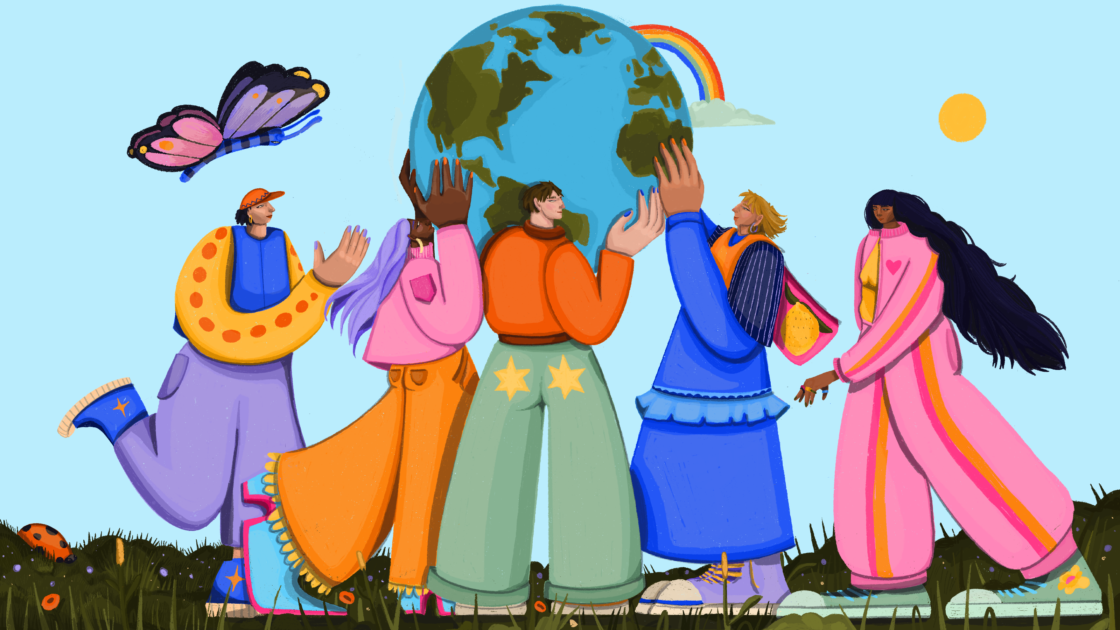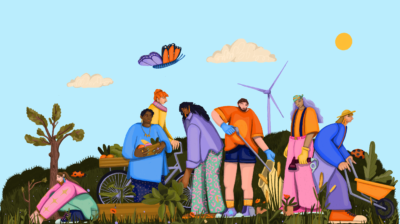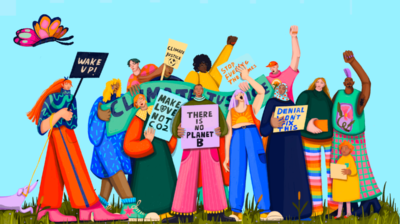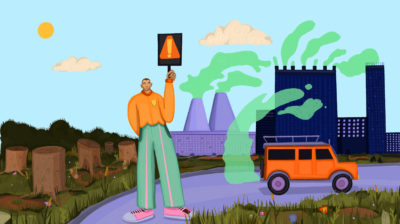What is climate justice?
The effects of the escalating climate crisis impact people unequally. Learn about why we need climate justice.

What is climate justice?
Climate justice is an idea for a fair society where both the burdens and benefits of addressing climate change are shared equally. Although climate change is a universal problem, the effects of the escalating climate crisis, such as drought, flooding, or sea level rise, unequally impact different communities and regions. The world’s most vulnerable populations deal with the worst effects of climate change while being the least responsible for it. When activists make calls for climate justice, they are standing up for these vulnerable communities. They are also demanding accountability and action from those responsible for the climate crisis.
Climate justice is associated with environmental justice. Environmental justice is about how some communities must shoulder the burden of environmental damage and pollution more than other communities.
What is climate change?
Climate change is a direct result of global warming.
It is caused by human activities such as:
- The use of fossil fuels (such as coal, oil and gas)
- Unsustainable agriculture practices
- Deforestation
Since the 1880s, climate change has been responsible for an increase in planet-heating greenhouse gases in the atmosphere, causing global temperature rise and imbalances in the earth’s natural ecosystems. The consequences of climate change are severe, such as extreme weather events like storms, hurricanes, heatwaves and droughts. These events affect the livelihoods of people all over the world. Learn more about climate change.
Climate change and inequality
Despite global efforts to address the climate crisis, greenhouse gas emissions continue to rise. The effects of climate change have hit many regions across the world. 2023 saw the hottest summer on record and wildfires across parts of North America, Europe and Asia. Major flooding events are destroying towns and cities and resulting in catastrophic loss and damage to nature and people.
Most of these extreme climate events are hitting specific populations first and hardest. According to the Intergovernmental Panel on Climate Change (IPCC), the poorest and most vulnerable countries are most at risk of the worst effects of climate change. However, they are the least responsible for greenhouse gas emissions. Currently, the wealthiest and most developed countries, including Ireland, produce the majority of emissions through industry, lifestyle and waste. Research estimates that if 48 African countries tripled their electricity consumption through the use of natural gas, the emissions would still be less than 1% of the global total.
Marginalised communities who already experience social or economic barriers may also face disadvantages caused by climate change. Especially if they live in geographically vulnerable areas such as floodplains. Communities, who historically have experienced discrimination lack the resources to prepare for climate change. Their voices are often left out of decision-making processes that directly affect their lives and their local environment. For example, in the US, the health of many Indigenous communities and the lands they live on are threatened by fossil fuel development. These projects were approved by the government without the input of local communities.
Why do we need climate justice?
The unequal impacts of climate change highlight the inequalities in society. Climate justice aims to address the power imbalance at the heart of climate-related issues. It does so by demanding that marginalised communities are given a voice. It is also important to make sure that any measures taken to address the climate crisis do not worsen pre-existing inequalities. This means that the financial cost of climate adaptation and mitigation is shared fairly. This is based on how responsible a country is for greenhouse gas emissions and its ability to pay.
Many advocates for climate justice see it as an idea that tackles the root causes of both climate change and inequality. In this way, climate justice is also a global justice issue. It centres our fundamental human rights to live in harmony with each other and with nature on a healthy planet.
The Principles of Climate Justice
The Mary Robinson Foundation has laid out seven core principles of climate justice. These principles were developed by a group of climate justice experts and activists from around the world.
- Respect and Protect Human Rights
- Support the Right to Development
- Share Benefits and Burdens Equitably
- Ensure that Decisions on Climate Change are Participatory, Transparent and Accountable
- Highlight Gender Equality and Equity
- Harness the Transformative Power of Education for Climate Stewardship
- Use Effective Partnerships to Secure Climate Justice
You can read more about the Principles of Climate Justice here.
Climate justice in Ireland
To achieve climate justice in Ireland, all the burdens and benefits of climate action must be shared equally across Irish society. Policy created to tackle the climate crisis runs the risk of hitting marginalised or vulnerable communities the hardest if their needs are not accounted for. According to the Think-Tank for Action on Social Change (TASC), these communities include Travellers, people with disabilities, migrants, refugees, people from low-income backgrounds, young people and the elderly.
Transitioning away from an unsustainable economy will also require big changes in certain sectors, such as agriculture and forestry, which will impact people employed in these industries. The process of making this shift towards a sustainable future fair and inclusive is what we call a just transition.
Climate justice recognises that in order to adequately address the climate crisis, financial investment in climate actions across the world must be ramped up, particularly in developing regions. Ireland has consistently been ranked as one of the worst countries in Europe for greenhouse gas emissions, so it has a significant part to play in international climate aid. The Irish Government’s Climate Action Plan has committed to contributing €225 million per year to developing countries by 2025. While this is an improvement on the country’s previous climate finance targets, aid organisation Trócaire estimates that Ireland’s fair share of climate finance would need to increase to around €500 million per year to account for the country’s poor climate performance.
How to take action for climate justice
The climate crisis affects us all. Therefore, it is everyone’s responsibility to take climate action. Fighting for climate justice can create a society in which human activities do not take a toll on the planet, and empowered communities thrive together. While changing behaviours – such as cutting down how much meat and dairy we eat, taking public transport or reducing household waste – is a key part of tackling the climate crisis, it is also important to take action together for our planet.
Learn more about how you can take action for the climate:
- How to get involved in climate activism in Ireland
- Climate action groups for young people in Ireland
- How to take climate action in your local community
Feeling overwhelmed and want to talk to someone?
- Get anonymous support 24/7 with our text message support service
- Connect with a trained volunteer who will listen to you, and help you to move forward feeling better
- Whatsapp us now or free-text SPUNOUT to 50808 to begin.
- Find out more about our text message support service
If you are a customer of the 48 or An Post network or cannot get through using the ‘50808’ short code please text HELLO to 086 1800 280 (standard message rates may apply). Some smaller networks do not support short codes like ‘50808’.






